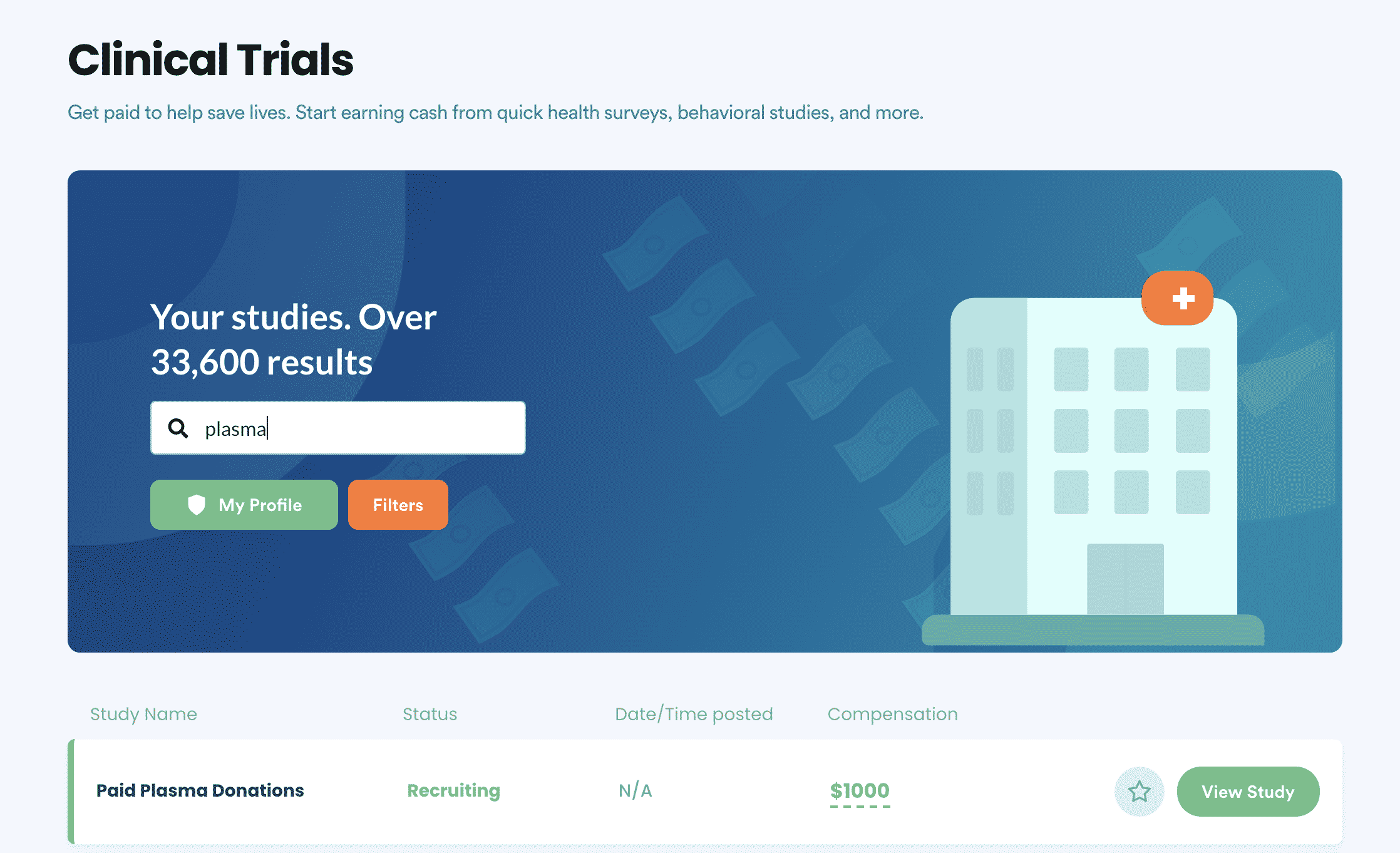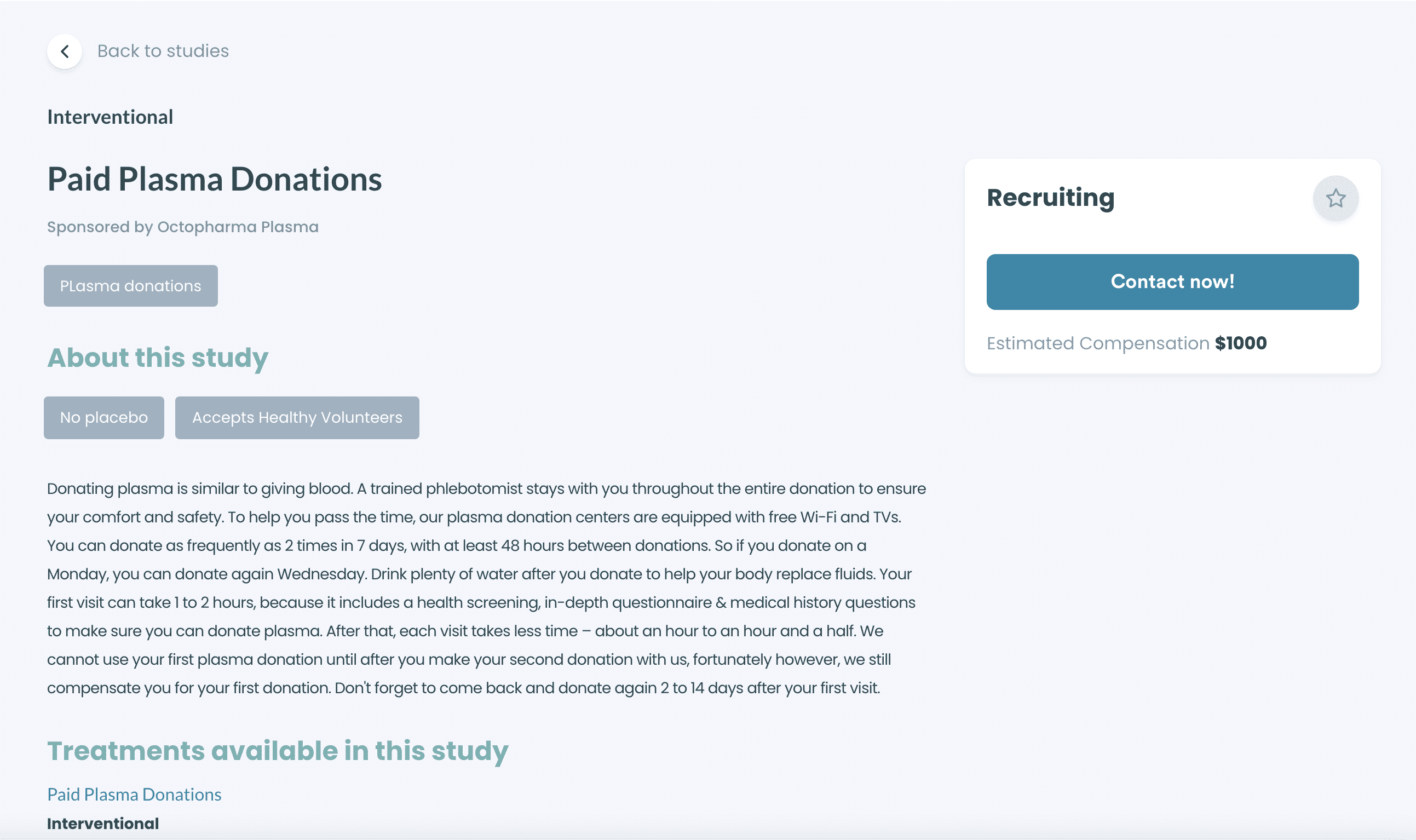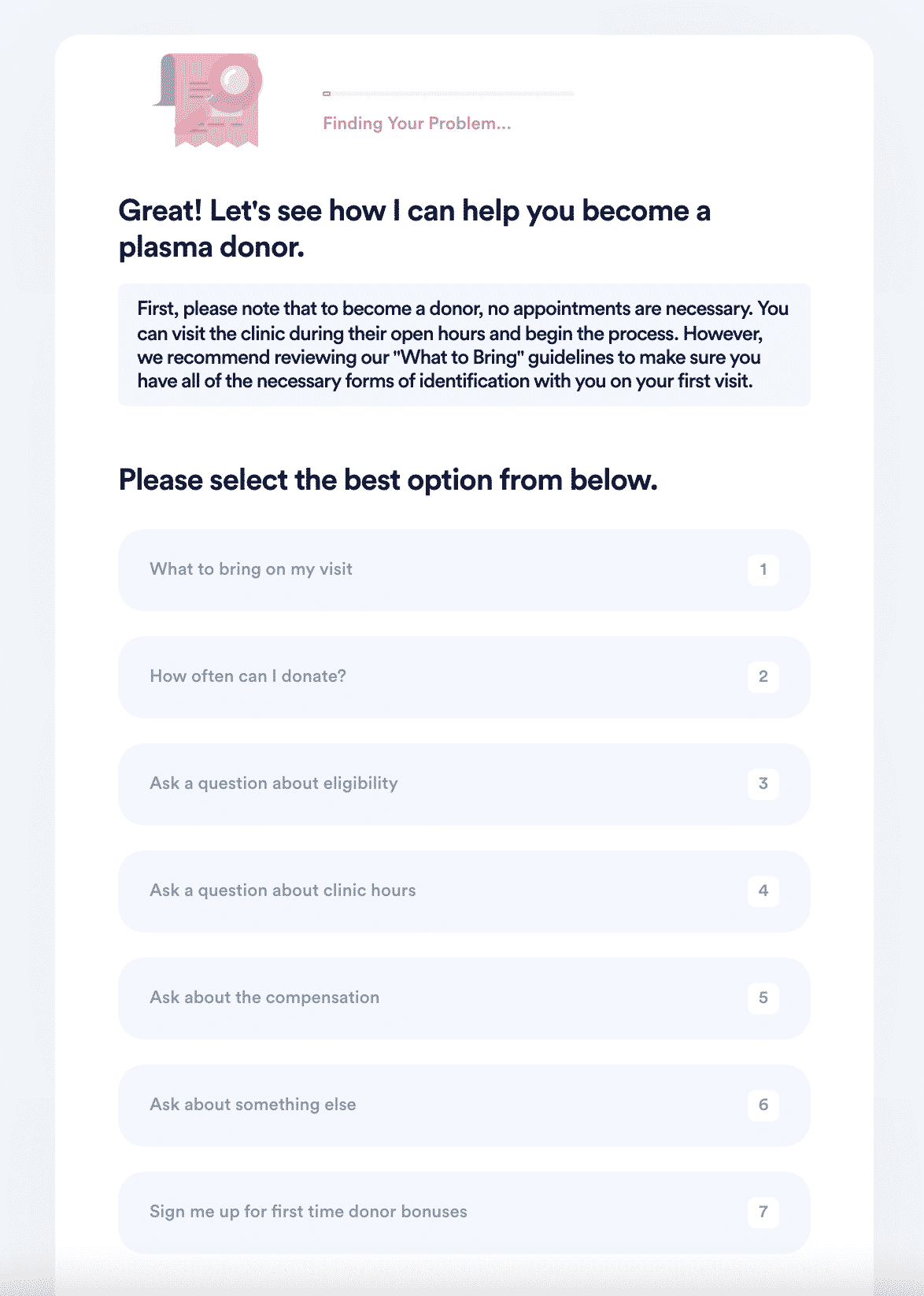Do You Get Paid to Donate Convalescent Plasma?
Plasma donation is a rewarding way to help other people—and yes, you do . Whether you want to donate plasma for money or simply help as many people as you can, your plasma (whether convalescent or not) may be used to help someone live a healthier, happier life.
As with any other health decision, it's important to weigh the pros and cons of donating plasma. The donation process is highly regulated and considered safe, but even so, you probably have a few questions about how to donate plasma:
- How often can you donate plasma?
- What are the eligibility requirements?
- Are you old enough to donate plasma?
- How long does it take to donate?
- Can you donate plasma after receiving the COVID-19 vaccine?
- Is there anyone who can't donate plasma? For example, are diabetics eligible?
With so many factors at play, the process can seem overwhelming—but don't let it stop you from donating. DoNotPay can help you narrow your options and understand the process and your estimated compensation before you begin, so you know what to expect as you proceed.
What Is Convalescent Plasma?
Plasma is the liquid part of the blood that contains the elements required for clotting. Donated plasma is often used to treat cancer, liver disease, burns and trauma, and blood clotting issues. Because that plasma is rich in antibodies, it can be used to help someone else fight the same illness.
Convalescent plasma has been used in the past to treat illnesses like hepatitis and the flu. Today, it's being used in some areas for COVID-19 as an "investigational product" as specified by the FDA. If you've recovered from COVID-19, your convalescent plasma may be needed. Though the American Red Cross has discontinued its COVID-19 convalescent plasma collection program, other collection organizations may still be looking for it.
Furthermore, they may be looking for convalescent plasma for other types of illnesses. Contact your nearest plasma donation center to learn more.
Why Donate Convalescent Plasma?
If you're thinking, "I want to donate plasma," you might already know why it's important. There are several reasons why people donate plasma:
- They want to help other people
- They've had a particular illness, like COVID-19, and know that their convalescent plasma may help other people who are suffering from that illness
- They want to earn money
Plasma Donor Eligibility Requirements
Eligibility may vary by organization or location, but in general, you must meet the following requirements if you want to donate plasma:
- Be at least 18 years old
- Weigh over 110 pounds
- Provide a photo ID and home address
- Pass a physical exam and health screening
- Test negative for certain viruses, like HIV
For COVID-19 convalescent plasma, you may need to meet additional requirements:
- Proof of recovery from COVID-19 (a positive test while you were sick or a positive antibodies test after you recovered)
- Must be currently healthy and be at least 28 days past your last symptoms
If you have received the COVID-19 vaccine, you can still donate plasma if you are healthy and symptom-free. You should wait two weeks after your shot before donating plasma, and keep in mind that the donation facility may ask to see your vaccine card or want to know which vaccine you received.
Where Can I Donate Convalescent Plasma?
There are hundreds of locations all over the United States operated by the American Red Cross, CSL Plasma, BioLife Plasma, and other private plasma donation companies. Visit the company's website and search by state or zip code to find one near you. The Red Cross is no longer specifically collecting convalescent plasma, but you can still donate your plasma there.
Do You Get Paid to Donate Convalescent Plasma—and How Much?
Yes, you do receive a stipend in exchange for the time and effort it takes you to donate plasma, whether it's convalescent or not. Many organizations put your rewards on a prepaid debit card. Different organizations and locations offer different incentives, and there may be other factors, like your weight, that determine your total compensation. There may be a bonus for first-time donors, as well.
| CSL Plasma | You may receive up to $1,100 in your first month. Fill out the new donor registration for a $10 bonus. There's also a rewards program that allows you to earn points for each donation, which you can turn in for gift cards. |
| Octapharma Plasma | You can earn more than $700 per month, with per-donation fees based on location, time of year, and time it takes to donate. There are also occasional donor promotions that could help you earn more and a rewards program for loyal donors. |
| BioLife Plasma | You're compensated for each donation on a prepaid debit card, which you can use anywhere Debit Mastercard is accepted. Comparing the many plasma collection companies can take time. DoNotPay can help you narrow your options and determine which organization is best for you. |
What You Should Know Before You Donate Plasma
Before you donate, make sure you plan to ensure you're eligible and prepared for the experience.
How Long Will My Appointment Take?
It generally takes about 90 minutes to two hours for your first plasma donation. Subsequent donations usually take less time, maybe 45-90 minutes.
What Should I Do Before I Donate Plasma?
- Do not drink alcohol for at least 24 hours before your appointment
- Do not schedule an appointment if you've recently gotten a piercing or tattoo (depending upon the organization and your circumstances, you may need to wait four to 12 months after receiving a piercing or tattoo before you can donate plasma)
- Drink plenty of water and eat a meal before you go to your appointment
- Avoid caffeine
- Bring your government-issued ID and proof of residency (some organizations may require additional identification)
What Will Happen During Plasma Collection?
In general, you'll be asked to complete a health questionnaire and undergo a physical exam and a blood test. If you pass, you'll continue with the process.
The needle will be inserted into your vein, and your blood will pass through a machine that separates the plasma from the other elements, which will be returned to your body. When you're done, you may receive a snack and a drink, and you are often welcome to sit and rest for a few minutes before you leave. This can be a good idea, as plasma donation could leave you feeling temporarily faint or dizzy.
How Often Can I Donate Plasma?
The Red Cross accepts plasma donations from an individual every 28 days or 13 times per year. Private organizations may allow you to donate as often as twice per week.
How Do I Decide Where to Donate Plasma?
Chances are, several donation organizations are operating in your area, each with several locations. You could simply go to the one closest to your house, but if compensation is important to you, you'll need to figure out how to maximize it. You should also ensure you meet the eligibility requirements before you make an appointment. This process typically requires some time and effort, so schedule yourself a few hours when you can compare the different options in your area. If you have questions, you'll need to contact the donation center and wait for a reply.
If you live in a city with multiple plasma donation centers, this can quickly get overwhelming. How can you be sure you're making the most of your time and plasma donation? DoNotPay can help.
How to Donate Plasma With the Help of DoNotPay
Our Clinical Trials Product can, among other tasks, help you find the best plasma donation sites near you. We can provide eligibility requirements, offer details about the donation process, and outline your potential compensation. If you have questions, we can contact the organization on your behalf so you can start the donation process with confidence.
Here's how you can use DoNotPay to become a plasma donor:
- Search "plasma donations" on DoNotPay and find the nearest donation clinic through our clinical trials product.

- Select the "Contact Now" button to learn more about eligibility criteria, contact the clinic with questions, or sign up for first-time donor bonuses.

- Verify your information and submit your inquiry! DoNotPay will contact the clinic on your behalf and make sure your questions get answered.

Why Use DoNotPay to Become a Plasma Donor
We make it simpler and easier. You're already busy, and you may even be wondering when you'll find time to donate—so there's no need to waste any time trying to figure out where to go or what to do. We'll provide all the details for you so you can make an informed decision. This process works for any plasma donation center in the country, and you can use DoNotPay for a variety of other hassles, too.
What Else Can DoNotPay Do?
Our AI Consumer Champions help you tackle some of life's most common challenges, from figuring out how to to signing up for other clinical trials and so much more. We're here to take the guesswork out of frustrating and confusing situations. Take a look at everything we can do for you:
- Create an advance health care directive
- File an insurance claim
- Close a bank account
- File SEC complaints
- Find discounts on your favorite products and services
- Request sick leave
- Lower your payday loans
- Request leave from jury duty
Ease your mind about perplexing financial challenges. Get started with DoNotPay today!


